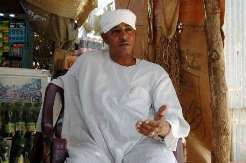Sudanese official says regime change in Chad will be a ‘positive’ development
February 04, 2008 (KHARTOUM) — A Sudanese official and a suspected Janjaweed leader said today that a regime change in Chad will “reflect positively” on his country.

The militia leader however dismissed allegations of Sudanese involvement in the recent clashes between the rebels and the Chadian government.
Some 1,000-1,500 insurgents equipped with pickup trucks mounted with machine guns arrived on the city’s outskirts Friday after a three-day push across the desert from Chad’s eastern border with Sudan. They entered the city early Saturday, reportedly trapping President Idriss Deby in his palace.
However the rebels appeared to have been pushed back by resisting government forces on Sunday.
Hilal described any talk about Sudan support to the Chadian rebels as “baseless”. He further said that the open borders and tribal interaction on the borders cause people to believe that Sudan is behind the coup attempt in Chad.
The Sudanese government has recently appointed Hilal as an adviser sparking anger from the US and human right groups.
Hilal has been named by numerous eyewitnesses in Darfur as leading terror campaign against the African tribes in the war ravaged region.
The tribal leader denied any wrongdoings and told Human Rights Watch (HRW) in a videotaped interview in 2005, that he only recruited militias on behalf of Sudan’s central government.
The 43 years old was jailed by the Sudanese authorities in 1998 for leading armed robbery of the central bank in the city of Nyala in Darfur. However the First Vice president Ali Osman Taha secured his release in 2002 for unknown reasons.
The UN Security Council imposed a travel ban and an asset freeze on Hilal in April of 2006. The US president George Bush ordered similar sanctions on him.
The Darfur conflict began in 2003 when an ethnic minority rose up against the Arab-dominated government in Khartoum, which then was accused of enlisting the Janjaweed militia group to help crush the rebellion.
(ST)
